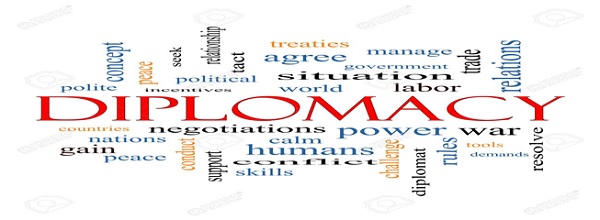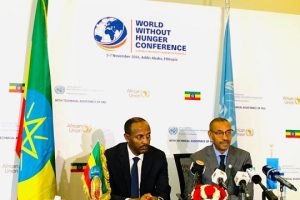
Since the signing of the Pretoria peace agreement, Ethiopia has been making commendable efforts to restore its position in international diplomatic affairs. These efforts have borne fruit as Ethiopia’s foreign relations with various nations have witnessed a significant improvement. Besides, the agreement has proved to be a crucial factor behind Ethiopia’s recent diplomacy success, as it has opened up new avenues for the nation to strengthen its ties with various countries and enhance stability and cooperation in its foreign relations.
The country’s standing within the international community was temporarily affected by the conflict that lasted for two years in the northern Ethiopia. However, the Ethiopian leadership responded to this situation in an open and transparent manner engaging with various international communities and sharing the truth about the situation.
This approach helped bring clarity to the conflict and instill confidence in the country’s commitment to peace and stability. Ethiopia’s willingness to engage in dialogue even during times of conflict has demonstrated to the international community that it is a reliable and trustworthy partner.
Ethiopia’s leaders received high-profile visits from world leaders, foreign ministers, and representatives of international organizations. These visits served as a testament to Ethiopia’s diplomatic momentum and its continued attractiveness as a partner for development and cooperation. The conflict resolution and the country’s diplomatic engagement have also positioned Ethiopia as a leader in the Horn of Africa and beyond.
The peace agreement has provided Ethiopia with an opportunity to move towards a new chapter of stability and cooperation in its foreign relations. As the country works towards consolidating peace and stability on the domestic front, it will be able to strengthen its role as a key player in the regional and global diplomatic arena.
Through the proper handling of the conflict resolution process, Ethiopia has demonstrated its commitment to peace building and its readiness to tackle difficult issues through dialogue and negotiations. As such, it has established itself as a critical player in regional peace and stability initiatives. Ethiopia’s diplomatic efforts have focused on driving economic growth and development in the country and the wider region.
Ethiopia’s participation in various counter-terrorism initiatives has been driven by the recognition that terrorism remains a significant threat to global peace and security. The country has been actively leading efforts to promote regional security and peace in the face of threats posed by terrorist groups. Ethiopia’s counter-terrorism interventions aim to promote stability in the region, ensure national security, and protect its citizens from the threat of terrorism.
The country has been actively involved in various counter-terrorism initiatives, including military interventions, intelligence and information-sharing programs, and capacity-building programs. Its involvement in these initiatives is driven by its national security interests and its aim to promote regional stability and peace.
Its efforts in the fight against terrorism have made it a key player in the region, and its cooperation with regional and international partners has been crucial in creating a coordinated and effective response to the threat of terrorism. Furthermore, Ethiopia’s diplomatic efforts have been focused on promoting peace, stability, and social and economic development. The successful resolution of the recent conflict, coupled with Ethiopian leadership’s engagement with international communities has shown Ethiopia’s commitment to openness and willingness to tackle challenges through dialogue and negotiations.
The conflict had a temporary impact on Ethiopia’s diplomatic relations, as some countries reduced their engagement. However, the country’s leadership took an open and honest approach, engaging with international communities and sharing the truth about the situation. As a result, suspended issues, including loan renewals, began to be addressed.
The agreement was welcomed by regional and international actors as a major step towards resolving the conflict and restoring stability in Ethiopia. The positive impact of the peace agreement on Ethiopia’s foreign policy is evidenced by multifacted realities.
The visit of Italian Prime Minister Giorgia Meloni to Addis Ababa on April 14 and 15 was the first visit of a Western head of government to the country since the November 2022 signing of the Pretoria peace deal. According to MoFA, the visit was aimed at deepening the partnership between the two countries. It was stated that during her stay, she met with Prime Minister Abiy Ahmed and high-level government officials from Ethiopia and the African Union.
Strengthening humanitarian and development assistance support for Ethiopia was at the top of the agenda. Ideas were also exchanged on regional, continental, and global issues of common concern. According to reports, Italy has decided to resume development cooperation with the country, putting on the table €125 million for the country’s reconstruction.
On May 4, Germany’s Chancellor Olaf Scholz paid one-day visit to Ethiopia and had a discussion with Prime Minister Abiy Ahmed. In their discussion, PM Abiy and Chancellor Olaf Scholz exchanged views on enhanced Ethio-German partnership in addition to regional and multilateral issues. “Pleased to receive Chancellor Olaf Scholz this evening, where we discussed enhanced Ethio-German partnership in addition to regional and multilateral issues,” the premier twitted.
Also, South Sudan President Salva Kiir visited Ethiopia for a one-day working visit on August 7, 2023. During a working lunch held at the Office of the Prime Minister, the two leaders discussed bilateral issues, including trade and infrastructure development, as well as regional peace and security issues.
“As neighbors with common regional interests, we will continuously strengthen our cooperation,” the Prime Minister said after his meeting with President Salva Kiir. It was recalled that the two countries signed a pact to promote bilateral security relations in 2022.
According to MoFA, in a bilateral meeting the leaders of the two countries held with their respective delegations, they acknowledged the ever-strengthening ties between Ethiopia and the UAE. Following the bilateral meeting, the leaders presided over a signing ceremony of 17 agreements in various sectors, including industry, agriculture, investment, and finance.
Ambassador Dina Mufti, a seasoned Ethiopian diplomat, shared insights with the EPA on Ethiopia’s diplomatic progress over the past year. He acknowledged the presence of obstacles in the diplomatic arena, with the northern Ethiopian conflict being a significant hindrance. Resolving these conflicts in a peaceful manner required navigating through ups and downs. However, the successful resolution of the conflict stands as a significant achievement for Ethiopia’s diplomatic endeavors. The Pretoria agreement can be highlighted as a result of the country’s diplomatic movement, showcasing Ethiopia’s commitment to peace.
The conflict attracted various influences from international governments and organizations. Ethiopia’s struggle to overcome these influences has yielded success. Despite challenges, the country has achieved economic and social growth under such circumstances. Ambassador Dina emphasized the resilience and determination of Ethiopia to manage external influences.
Ethiopia’s membership in the BRICS bloc presents a significant opportunity to expand its diplomatic reach. Ambassador Dina said that this membership creates the chance to establish new partnerships alongside existing ones. The membership facilitates enhanced trade relations, increased investments, and accelerated technology exchange, fostering political interdependence. Ethiopia recognizes the immense potential for growth and development through its association with BRICS.
Ethiopia’s participation in various continental and international stages reflects the country’s commitment to safeguarding its interests. The shared understanding among participants was that protecting national interests leads to fruitful outcomes. Overall, Ethiopia’s diplomatic stance aims to shield the country from problems, obstacles, and outside influences.
The fourth round of water filling at GERD was one of the greatest achievements of Ethiopia’s diplomacy this year. He regarded the fourth round of water filling at the Grand Ethiopian Renaissance Dam (GERD) as one of Ethiopia’s most significant diplomatic achievements. The successful cooperation displayed during this process has showcased Ethiopia’s effectiveness in withstanding diplomatic pressures.
The national success that Ethiopia has achieved in resisting external pressures and supporting the construction of the GERD highlights the country’s unwavering commitment to utilizing the dam’s vast potential while also considering the benefits it can bring to the countries located within the Nile Basin.
BY EYUEL KIFLU
THE ETHIOPIAN HERALD TUESDAY 26 SEPTEMBER 2023




